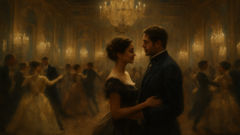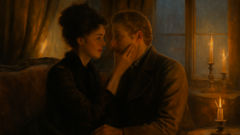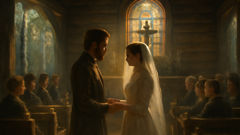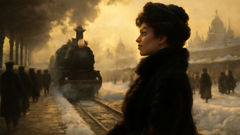Introduction
In the waning golden light of a Russian afternoon, the city of Moscow breathes beneath its onion domes and gilded spires, shivering with the promise of winter. Carriages clatter across cobbled boulevards, and the air carries hints of woodsmoke and snow. Within salons embroidered with silk and the scent of tea, the privileged dance between duty and desire, their laughter echoing against crystal and polished silver. But beneath the velvet and ritual, a different current stirs—a longing, a restlessness, the ache of hearts that refuse to be tamed by tradition. Anna Alexandrovna Rogozina, whose beauty seems almost to defy the cold itself, steps onto the railway platform with a suitcase full of secrets. Her marriage to the steady, honorable but distant Count Alexei Rogozin has given her respectability and comfort, yet her eyes hold a loneliness sharpened by every passing year. At the same station, Konstantin Levin, a landowner from the provinces, returns to Moscow burdened by questions that haunt his sleepless nights: Is happiness possible? Is there meaning in the endless cycle of harvest and frost? While Anna's story will sweep through glittering ballrooms and the snow-swept streets of St. Petersburg, and Levin’s will unfurl across birch forests and candlelit studies, their fates are joined by the silent threads of longing, hope, and the inexorable march of time. Amid the glare of chandeliers and the hush of falling snow, love and tragedy will collide—leaving footprints that echo far beyond the ballroom’s edge.
I. Glimmering Masks and Hidden Hearts
Moscow, 1878. The season is at its height. Grand halls pulse with waltzes, the air thick with perfume and intrigue. Anna’s arrival at the Rogozin family’s winter residence is met with whispers—she is a vision of composure, but those who look closely see the shadow in her gaze. Her husband, Count Alexei, greets her with the courteous affection reserved for porcelain, not passion. Their marriage is a union of expectations, as carefully arranged as the flowers in the crystal vases of their drawing room.

Anna moves through her days surrounded by luxury: lacy dresses from Paris, operas attended with a face practiced in delight, afternoons of polite visits where conversation glides above anything truly dangerous. Her son, Sergei, is the bright point in her life, but even he cannot fill the silent spaces. Anna finds herself staring out frost-painted windows, watching the snow swirl and settle—yearning for something unnamed.
In another corner of Moscow, Konstantin Levin wanders the library of his old friend Stepan Oblonsky. Stepan, Anna’s brother, is as charming and unreliable as ever, trailing debts and laughter wherever he goes. Levin envies Stepan’s easy manner, his ability to skate atop the surface of life. Levin has just returned from his estate, where the land lies dormant beneath a thick blanket of snow and the peasants’ songs drift like memories on the cold wind.
He has come to Moscow in hope—a hope named Ekaterina Shcherbatskaya. Kitty, as she is known, is gentle, intelligent, and, Levin believes, the answer to his loneliness. But Kitty’s heart has been bruised by another: the dashing officer Count Vronsky, whose flirtations have left her adrift and uncertain.
Anna first meets Vronsky at a railway station—one of those moments that feels both accidental and fated. He is tall, with eyes as restless as her own. Their conversation is brief but electric. Anna feels herself drawn, not just to Vronsky’s charm, but to something deeper—a sense of being truly seen. That night, as she lies beside her sleeping husband, Anna’s thoughts return to the platform: the smell of coal smoke, the hush before a train’s arrival, the glance that changed everything.
Society’s eyes are always watching. At a glittering ball in St. Petersburg, Anna’s beauty dazzles, but it is Vronsky’s attention that turns heads. Kitty, fragile and hopeful, watches as the man she adores is ensnared by Anna’s gravity. The moment is almost silent: a dance, a smile, a promise. In that instant, lives begin to unravel—quietly, irreversibly.
Levin, meanwhile, is crushed by Kitty’s rejection. He flees Moscow for his estate, burying himself in the rhythms of rural life. The peasants’ laughter, the scent of earth, the slow thaw of spring—these become his balm, though questions still gnaw at him. Why is happiness so elusive? Can love survive the weight of expectation?
Anna, back in St. Petersburg, cannot forget Vronsky. Their stolen meetings become an open secret. Her laughter is brighter in his presence; her eyes, once so guarded, now shimmer with possibility. But each joy is shadowed by dread. Anna knows the rules of her world. An affair is not just scandal—it is exile. Yet she cannot stop herself from falling.
II. Fires Beneath the Snow
St. Petersburg’s streets are a tapestry of white and gold, the palaces luminous in winter twilight. Anna’s affair with Vronsky deepens—each encounter both a balm and a wound. They steal hours in shadowed apartments, their conversations urgent and honest in a way neither has known before. For Anna, love is both revelation and ruin. Every letter from her husband, every polite inquiry at a soiree, is a reminder of the line she has crossed.

The cost is swift and severe. Whispers grow into accusations. Invitations dwindle; friends become wary. Anna’s family—especially her young son—becomes a distant shore she can no longer reach without pain. Count Rogozin is not cruel, but his pride is a fortress. When Anna confesses her love for Vronsky, he forbids her to see their son again if she leaves. The threat is like a blade—Anna is forced to choose between love and motherhood.
Vronsky, for all his devotion, is not immune to the pressures of rank and expectation. He offers Anna escape—a life together abroad, far from Russian judgment. But even as they plan, doubts creep in. Vronsky’s military career falters; friends drift away. Anna feels herself becoming a burden, even as she clings to the hope that love can outlast the storm.
In the provinces, Levin finds solace in the honest labor of his estate. The thaw reveals green shoots and new possibilities. He spends long days with his workers, sharing bread and laughter. He begins to see beauty in the ordinary: the way sunlight glints on water, the satisfaction of work well done. When news reaches him of Kitty’s illness—a lingering sadness that doctors call “nerves”—he writes her a simple, heartfelt letter. Kitty responds, and slowly, a new correspondence blooms between them, rooted not in grand gestures but in genuine understanding.
Anna’s world, meanwhile, narrows to Vronsky and the child they have together, a daughter named Serafima. Happiness, when it comes, is fragile—a fleeting warmth before the next cold wind. Anna’s love is fierce but tinged with desperation. She cannot bear the thought of losing Vronsky, yet senses his unease. The city that once celebrated her now recoils; her beauty becomes her curse.
As spring breaks the city’s icy grip, Anna’s isolation deepens. Her letters to her son go unanswered; her old friends are shadows. Even Vronsky, though loving, grows restless. Anna’s moods swing from radiant joy to stormy despair. The world outside their apartment is both tantalizing and forbidden. Anna watches the carriages roll by beneath her window and wonders if happiness was ever truly within reach.
III. Fields of Meaning
Konstantin Levin’s life is quieter but no less turbulent. In the endless green of his estate, he toils alongside his peasants, seeking meaning in honest work. He reads philosophy by candlelight, debates with his brother about faith and doubt, and walks for hours through birch forests, his mind swirling with questions. Yet the ache of loneliness persists—until Kitty arrives.

Their reunion is shy at first, marked by apologies and half-smiles. But Kitty has changed; her illness has given her a new depth, a gentleness born of pain. Levin, too, is humbler, more open to life’s unpredictability. They marry in spring—a simple ceremony in a country church, attended by family and neighbors. For Levin, love is not a blaze but a slow-growing warmth. Kitty’s presence brings order to his restless heart.
Together they face the small dramas of daily life: managing the estate, caring for workers’ families, enduring the joys and sorrows of childbirth. Levin is often frustrated by the gulf between his ideals and reality—the stubbornness of the land, the complexity of human nature. He wrestles with questions of faith, sometimes finding solace in the Orthodox liturgy, sometimes drifting in doubt. But through it all, Kitty’s quiet support anchors him.
While Levin builds a family in the provinces, Anna’s world grows darker. Her love for Vronsky, once so exhilarating, now feels like a trap. Jealousy gnaws at her; she suspects Vronsky of longing for his old life, for the approval of society. The distance between them widens with every argument. Anna’s letters to her son become desperate, pleading. She finds no comfort in religion, no solace in friends. The city’s beauty is now a taunt—ballrooms she cannot enter, theaters she cannot attend.
Levin visits Moscow on business and is struck by the difference between his life and Anna’s. He sees Anna at a distance—her eyes feverish, her smile brittle. He is moved by her suffering but senses that no words can reach her now. Levin returns home, more grateful than ever for Kitty and their newborn son. He comes to believe that meaning is not found in grand gestures or public acclaim but in daily acts of kindness, in accepting life’s burdens with humility.
The contrast between Anna’s passionate turmoil and Levin’s hard-won contentment is stark. Their lives are mirrors: both seek happiness, both struggle with love and duty, but only one finds peace. As autumn comes, Anna’s despair deepens, while Levin stands in his fields, watching the leaves fall and finding, at last, a quiet kind of grace.
Conclusion
The story’s end arrives not with thunder but with the hush of falling snow. Anna, desperate and alone, boards a train beneath a steel-grey sky. Her heart aches for her son, for Vronsky, for the life that might have been. In those final moments, she feels both the enormity of her love and the impossibility of escape. Her tragedy is not born of weakness, but of a world that punishes longing—of a society unwilling to forgive those who break its rules. In contrast, Levin stands at the edge of his fields as dusk falls, holding his infant son. He is not free from doubt—life remains uncertain and often cruel—but he has found meaning in connection, in accepting the ordinary miracles of family and labor. The snow covers Moscow and the provinces alike, blurring distinctions and softening sorrow. Anna’s fate lingers as a warning and a lament, while Levin’s quiet redemption offers hope: that even in a world of heartbreak and exile, it is possible to carve out a measure of peace. Their stories endure, echoing down the corridors of time—reminding us that love can both wound and heal, and that happiness is found not in escape, but in embracing life as it is.













